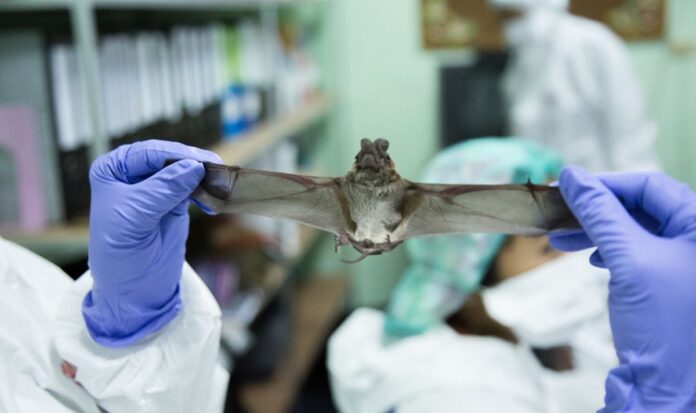Pictured: a bat sampled for exotic viruses as part of the USAID research The US Government has quietly terminated a program to identify exotic viruses found in wildlife that might one day infect humans, following safety concerns. ‘Discovery & Exploration of Emerging Pathogens–Viral Zoonoses’ — ‘DEEP VZN’ — short for — was a $124million, five year program launched late in 2021 by the United States Agency for International Development (USAID). The project was engaged in pathogen classification in areas of Africa, Asia, and Latin America believed to offer a high risk of viral spillover into humans. DEEP VZN was the successor to a decade-long virus-hunting program called ‘Predict’, which collected more than 140,000 biological samples, from which were identified 1,200 viruses with the potential to infect humans — including more than 160 novel coronaviruses. This long-running legacy came to a discreet end in July, an investigation published by the British Medical Journal (BMJ) has revealed, with the USAID informing the aides of Democrat and Republican members of relevant Senate committees that DEEP VZN was stopping. Pictured: USAID Administrator Samantha Power In a statement published in October 2021 announcing the launch of DEEP VZN, USAID said: ‘The COVID-19 pandemic has demonstrated how infectious diseases threaten all of society, up-ending people’s lives and attacking societies at their cores. ‘It is also a strong reminder of the connection between animals, humans, and the environment, and the effect that an emerging pathogen spilling over into humans can have on people’s health and on global economies. ‘The Biden–Harris Administration is committed to advancing global health security, international pandemic preparedness, and global health resilience. ‘Outbreaks do not respect geographic boundaries and can spread rapidly, jeopardizing the health, safety, and economic security of every country — including the United States. ‘DEEP VZN will advance the US Government’s global health security and foreign policy priorities by supporting efforts to prevent, detect, and respond to new infectious disease threats abroad.’ Pictured: Washington State University experts involved in the hunt for emerging diseases DEEP VZN has faced criticism from skeptics of the program within both major political parties and beyond — with concern that the effort to get ahead of potential pandemics might inadvertently bring about the exact outcome it sought to mitigate against. Such ‘misgivings’, argues investigator David Willman, ‘continue to resonate, as the cause of the SARS-CoV-2 pandemic, the world’s deadliest such event in a century, remains unproved.’ According to the BMJ, for example, December 2021 saw two senior White House officials — Daniel Gastfriend, director for biodefense and pandemic preparedness at the National Security Council and Jason Matheny, President Biden’s deputy assistant for technology and national security — privately approach USAID Administrator Samantha Power. Expressing their concerns over DEEP VZN, they reportedly then advised her to terminate the program. Subsequently, similar fears were also privately raised with USAID staff by Dr T. Gregory McKelvey, Jr, assistant director for biosecurity with the Office of Science and Technology Policy. Trending SUBSCRIBE Invalid email We use your sign-up to provide content in ways you’ve consented to and to improve our understanding of you. This may include adverts from us and 3rd parties based on our understanding. You can unsubscribe at any time. More info
Exotic virus hunting program quietly shut down by US Government over safety fears
Sourceexpress.co.uk
RELATED ARTICLES


